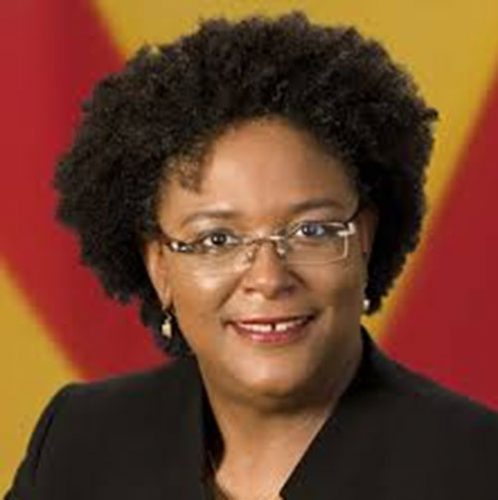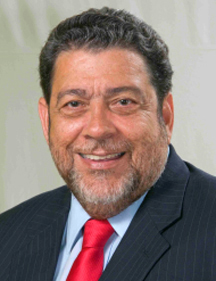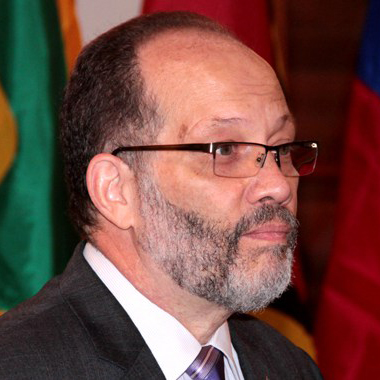Caribbean Community (CARICOM) Secretary General Ambassador Irwin LaRocque yesterday stressed that each action taken by the Community to help resolve Guyana’s elections crisis was “by invitation” and in an attempt to maintain regional grouping’s reputation as a bastion of democracy.
Speaking during a virtual conference for the handing over of CARICOM’s chairmanship from Barbados Prime Minister Mia Mottley to St. Vincent and the Grenadines Prime Minister Ralph Gonsalves, LaRocque described the Community as a family that supports its members during times of danger, such as blacklisting or when there are threats to territorial integrity.
“That is not interference,” LaRocque said of such assistance. “That is the CARICOM family being there for each other. It is that family spirit that will get us through this exceptional time,” he added.

LaRocque further noted that five Prime Ministers, representing one third of the leadership of CARICOM, visited Guyana by invitation to hold talks with the political leadership. “CARICOM’s involvement in the situation in Guyana has always been by invitation,” he stated before expressing gratitude to the three-person scrutinising team that was present for the national recount.
“I want to thank the independent CARICOM observer team for their personal sacrifice. The team was in Guyana, by invitation, and spent 46 days during the pandemic. I have every confidence in the work they have produced,” LaRocque stressed.

During her remarks, Mottley also acknowledged that CARICOM is a family and reminded that the states have a duty to support each other.
She, however, stressed that the Community “cannot ignore principles when it is inconvenient to stand by them.”
CARICOM has over the last four months sent teams to observe Guyana’s protracted electoral process. An electoral observer team departed in early March and two high-level teams subsequently travelled to Guyana twice to observe the recount.
A court challenge by a candidate of the APNU+AFC coalition to the parameters of the recount led to a month’s delay in the start. Once it was initiated, the process was completed in a month.
The CARICOM high-level team that observed the recount, led by Cynthia Barrow-Giles, Senior Lecturer in the Department of Government at the University of the West Indies (UWI), repeatedly stressed in its report on the process that they did not witness anything which would render the recount and by extension the casting of the ballot on March 2 “so grievously deficient procedurally or technically, or sufficiently deficient to have thwarted the will of the people.” In fact the team argued that the “public utterances of some GECOM commissioners, political pundits and politicians may have sounded an ominous tone for the 2020 Elections with the partisan driven and distorted narrative on migrant voting, phantom voting and implied voter impersonation.”
Claims of a fraudulent elections were specifically referred to as a “false narrative.”
The team declared that nothing it “saw up to the closing day of the recount suggested that the poll workers on March 2 conducted themselves in a manner which would indicate illegality or a deliberate intent to benefit a particular list of candidates over another.”
However despite committing to abide by their findings after deeming CARICOM the “most legitimate interlocutor,” President David Granger, who leads the APNU+AFC coalition, has failed to even acknowledged their full findings and has instead endorsed a report by Chief Election Officer Keith Lowenfield which invalidated 25% of the votes verified during the recount. Lowenfield’s actions has been soundly criticised by Mottley.
“…We must ask – on what grounds and by what form of executive fiat does the Chief Elections Officer determine that he should invalidate one vote, far less over 115 000 votes when the votes were already certified as valid by officers of the Guyana Elections Commission in the presence of the political parties”, she asked during a statement made on June 24.
In seeming retaliation for her comments on Lowenfield’s actions Mottley has been the target of attacks from members and supporters of the incumbent APNU+AFC coalition.
Several days later, Mottley responded to critics of her statement by succinctly noting that “the truth hurts”.
“The truth hurts but what we must never do in CARICOM is to avoid the truth and avoid our principles,” she reiterated.
The principles referenced by Mottley are those enshrined in the 1997 Civil Society Charter of CARICOM, which provides at Article VI that States shall ensure the existence of a fair and open democratic system through the holding of free elections underpinned by an electoral system in which all can have confidence and which will ensure the free expression of the will of the people in the choice of their representatives.
This “free expression of the will of the people” has been the foundation on which Mottley and several other CARICOM leaders, including Gonsalves, have criticised the actions of the incumbent coalition.
‘Regrettable’
Yesterday Mottley described as “regrettable” the fact that four months after the polls there is still no clarity as to the conclusion of the electoral process but noted that CARICOM will await the ruling of the Caribbean Court of Justice (CCJ), which has been engaged on legal challenges arising out of the disputes over the polls results.
“We have said what we have to say about that,” Mottley concluded.
For his part, Gonsalves lauded her handling of the situation in Guyana.
Gonsalves said that the “helpful initiatives” that Mottley had undertaken to “assist in preservation of democracy in Guyana within the provisions of the Charter of Civil Society will long be remembered.”
According to the long-time Vincentian leader, these initiatives will endure despite “vulgar and opportunistic criticism of [Mottley] from assorted jaundiced sources who ought to know better.”
Gonsalves previously called on President Granger to accept the results of a national recount of ballots and “take his licks like a man”.
“I am satisfied that CARICOM will not stand by idly and watch the recount– which was properly done–results be set aside,” he stressed last month during an appearance on a St. Vincent and the Grenadines radio show.
His comments were severely criticised by the incumbent, which claimed that his words were “prejudicial to the integrity of the process and its eventual outcome.”
Owen Arthur, the head of the Commonwealth Observer Mission to the March 2nd elections and former long-serving Prime Minister of Barbados, later came out in support of Gonsalves.
Arthur reminded that members of the Community have signed a Charter for Civil Society which enjoins upon them the responsibility to have free and fair elections.
“Leaders of CARICOM as a class would rather free and fair elections [and] if the government does not want to accept the results and still wants to stay in office then CARICOM will have to decide whether to suspend Guyana,” the former PM stated.
Previously, the Prime Minister of Trinidad and Tobago Dr. Keith Rowley refused to allow his country’s Chief Election Officer to be a part of the CARICOM scrutineer team for the national recount, saying that the country would prefer to retain its “pristine” reputation in such matters.
Rowley was the first head of state to express concern about the process, telling a reporter in April that he was concerned. “I am getting a feeling that this is not going to end well…I hope I am wrong but that feeling…I am not having a good feeling…I have this unsettling feeling [that grows] with every passing day,” he said.





